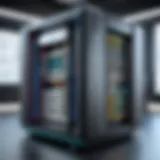Explore Hack Reactor Chicago: A Deep Dive into Coding Immersion


Intro
In recent years, the demand for skilled software developers has surged, driven by advancements in technology and the evolving digital landscape. This reality positions coding bootcamps as essential catalysts in transforming aspiring individuals into professional developers. Among these, Hack Reactor Chicago stands out for its immersive programs designed to equip students with practical skills. As we delve deeper, we aim to uncover how Hack Reactor tackles the ever-changing coding requirements through its unique curriculam and teaching approaches.
Overview of Software Development and Its Importance
Software development refers to the process of designing, coding, testing, and maintaining software applications. Given the rapid growth of technology, the ability to efficiently develop software solutions is invaluable. From enterprise applications to mobile software, proficiency in coding has become crucial across numerous industries.
Key features of software development often include:
- Iterative Cycles: The software development lifecycle relies on sustained iterations—a range of steps from planning, creating, testing to deploying.
- Agile Methodologies: Adaptability and continuous feedback guide many teams toward efficiency and focus on customer satisfaction.
- Collaboration Tools: Tools like GitHub for version control enhance team collaboration.
Software development holds significance for societies as it fuels innovations and optimizes processes. Consequently, this brings efficiency within sectors, translating into substantial economic impact.
Teaching Methodologies at Hack Reactor
Hack Reactor employs a project-based learning approach. Students engage in real-world coding instances that mimic dynamic work environments. Through collaborative peer programming, students enhance their communication skills and cultivate accountability.
Hack Reactor's pedagogy emphasizes active learning and peer reviews, cultivating a collaborative environment among students.
Additionally, instructor-led sessions further clarify complex topics. Instructors with industry experience play a pivotal role and offer both mentorship and focused attention to allow presonal development.
Curriculum Highlights
Specific elements of the Hack Reactor curriculum include:
- JavaScript Proficiency: Core concepts like functional programming, React.js, and Node.js offer a convergence of skills essential for full-stack development.
- Data Structures & Algorithms: These are fundamental across programming tasks and job interviews, preparing students adequately.
- Network APIs and Microservices: Understanding integrations and service-oriented architecture gears students towards practical application.
Challenges and Solutions
During this expedience, students are likely to face challenges such as managing time efficiently or grasping new concepts rapidly. Hack Reactor addresses this through structured support for hands-on exercises and teacher guidance.
Overall, prospective students must evaluate both rewards and obstacles associated to ensure alignment with educational goals.
Job Placement Success
Hack Reactor’s reputation is buoyed by critical job placement statistics. Typically, many graduates secure jobs within months of completing their programming course. Employers often prefer Hack Reactor graduates due to their readiness to tackle complex problems from day one.
Community Engagement
The community aspect at Hack Reactor fosters a network of developers. Hack Reactor Chicago engages in events and workshops that allow both external engagement and student bonding, oftentimes leading to coupling developers with industry opportunities.
In synthesizing Hack Reactor’s educational offerings, it becomes clear why students find this immersive experience valuable in an increasingly technology-driven job market. By equipping learners with both the technical acumen and necessary soft skills, Hack Reactor strives to transform any motivated individual into an employable software developer in the evolving Chicago tech ecosystem.
Overview of Hack Reactor Chicago
Hack Reactor Chicago has emerged as one of the more distinguished coding bootcamps in the region. Understanding its importance provides valuable context for tech enthusiasts contemplating a coding education investment. This overview touches on significant elements such as its historical anecdotes, core philosophy, and notable mission. Each of these factors combines to build the foundation of what applicants can expect from this rigorous program.
History and Background
Hack Reactor was designed to cater to the increasing demand for software engineers in the tech industry. Founded in 2012 in San Francisco, it soon opened various campuses, including Chicago. The conception of the bootcamp emerged from a recognizable gap — a fast-track solution for aspiring developers aiming for high-paying tech jobs without undergoing traditional degree programs.
Chicago, with its growing tech hub, became vital for this expansion, embracing a burgeoning demand for skilled labor while advocating for diversity and inclusion. Many city-born initiatives distribute tech education, yet Hack Reactor maintains a unique edge. Historical perspectives show a commitment to consistent curriculum enhancement, adapting new technologies and market trends, creating momentum for its distinct reputation.
Mission and Vision
The mission of Hack Reactor Chicago is defined by a commitment to break barriers within the tech sphere by cultivating proficient developers. Not just an institution, it positions itself as a community-oriented initiative that supports not only the growth of individual students but also collaborates toward elevating the tech landscape locally. Its vision revolves around accessible education that prioritizes real-world usage over theoretical concepts, incorporating applied learning right from the outset.
In essence, this means students are not pushed through textbook knowledge alone; they actively engage with hands-on projects and similar experiences throughout their journey.
This holistic perspective moves beyond mere job placement—ending up in real positions competing for the industry's most prominent projects.
By anchoring their mission to these fundamental principles, Hack Reactor Chicago raises the bar for coding bootcamps.
The carefully balanced blend of history and mission shapes the immersive experience, making Hack Reactor a prominent institution in the complex landscape of coding education.
Curriculum Structure


Understanding the Curriculum Structure of Hack Reactor Chicago is fundamental to comprehending its value in shaping capable software developers. The design of the curriculum not only reflects the essential skills needed in the tech industry but also an engaging learning experience. A well-structured curriculum promotes effective knowledge retention and practical application, enabling students to transition smoothly into the coding profession. The critical elements that define the structure assist learners in grasping complex subjects and translate theoretical knowledge into practical skill sets.
Core Curriculum Components
The core curriculum forms the backbone of the learning experience at Hack Reactor. It guides students through essential computer science concepts and practical programming skills. By covering a wide range of topics, the program ensures a well-rounded immersion. Key topics often include:
- JavaScript functions and concepts
- Asynchronous programming and API usage
- Data structures and algorithms
- Version control systems like Git
Each component serves a unique purpose in equipping students with well-rounded expertise. The integration of theoretical concepts with hands-on projects solidifies understanding and prepares students for real-world challenges.
Capstone Project Requirements
The Capstone Project represents the culmination of the learning experience at Hack Reactor Chicago. It allows students to showcase their skills and creativity while reinforcing knowledge gained. Students are typically required to build a functional application from scratch, demonstrating proficiency in coding and problem-solving. Important aspects include:
- Project Scope: Defining a project within real-world contexts brings practical applicability to skills learned.
- Collaboration: Often, students work in teams mimicking industry environments boosting crucial collaboration skills.
- Presentation: Effectively presenting projects to peers and instructors sharpens communication, an essential skill in tech roles.
Completing the Capstone is not just about developing a software product—it also aids in building a strong portfolio, crucial for future job searches.
Technology Stack Used
The technology stack at Hack Reactor Chicago comprises a curated selection of tools and technologies aimed at enhancing students' coding aptitude. Familiarity with diverse technologies lends flexibility and improves job-preparedness. Common tools in the curriculum include:
- React and Node.js: Essential JavaScript frameworks for developing web applications.
- MongoDB: A leading NoSQL database for data handling and retrieval.
- Git: Fundamental for version control.
Learning to navigate these technologies empowers students to tackle multiple development scenarios in the real world. The rapidly-evolving tech landscape demands strong tech competencies, and Hack Reactor identifies key needs through its carefully curated stack.
Focusing on practical tools ensures that graduates possess the skills that employers value. This enhances employability while giving students the confidence to work effectively in diverse development environments.
Teaching Methodologies
Teaching methodologies play a crucial role in the effectiveness of a coding bootcamp program such as Hack Reactor Chicago. The approach taken by the instructors not only affects the way students absorb information but also shapes their overall experience. Understanding the benefits and challenges of specific teaching methods helps potential students gauge what to expect.
Instructor-Led vs.
Self-Directed Learning
A significant part of Hack Reactor's design revolves around instructor-led learning. This method places knowledgeable instructors at the forefront, guiding students through complex concepts and offering immediate feedback. The structure ensures that students stay on track, pushing them to mastery through direct support.
On the other hand, self-directed learning prepares students for the realities of the tech industry. It encourages individuals to solve problems independently, simulating real-work scenarios. This dual approach balances the supportive environment of guided lessons with the need for personal initiative.
"Blending styles of learning enhances adaptability in students, a key trait for developers.”
Students often find that a mix of these methodologies leads to the most profound learning experiences. This means they can receive foundational knowledge and then practice applying it on their own initiative. Finding this balance may take effort at first, but it fosters deeper understanding in coding and promotes lifelong learning.
Peer Learning and Collaboration
In today's tech environment, collaboration is vital. Hack Reactor accentuates peer learning; students routinely work in groups to share ideas and solutions to problems. This not only fosters a sense of community but also mimics the collaborative nature of many workplaces. Working together allows students to learn from one another's strengths, and find different solutions to a single problem.
Moreover, peer learning cultivates communication skills which are as crucial as coding itself. By expressing and defending their ideas to fellow students, learners refine their own understanding. Assignments often prioritizing teamwork, signifying the importance of collaboration as part of their educational journey.
A culture of sharing also extends beyond pair programming; it encourages students to reach out for help when needed and share knowledge. This brings a constant momentum of learning that is beneficial throughout one's career.
Real-World Problem Solving
Hack Reactor emphasizes facing real-world challenges within the curriculum. Students engage with projects that reflect challenges they will encounter in actual tech roles. This focus provides a noteworthy advantage.
Working on real problems enables students to apply their skills in genuine contexts, allowing them to appreciate the relevance of their coursework. This transitions seamlessly into hands-on projects, like developing apps and contributing to open-source assignments, further diversifying the learning experience.
The methods used encourage adaptable thinking. Being taught with this goal allows graduates to see beyond simple coding tasks. It prepares them to tackle a variety of scenarios with ingenuity, often leading to innovative solutions. Students involved actively engage in critical thinking, thus becoming valuable assets in any tech company.
In summary, Hack Reactor Chicago leverages carefully considered teaching lmethods to develop competent individuals ready to navigate the rigors of the tech industry. Evaluating each component helps prospective students understand how the bootcamp will meet their learning and career ambitions.
Admissions Process
The admissions process is an essential aspect of Hack Reactor Chicago. It plays a critical role in determining who will don the mantle of software developer after completing the program. This scrutiny ensures that the individuals accepted possess the requisite drive and capability to thrive in an intensive coding immersion. The evaluation process starts long before aspiring students even step foot in the program, and understanding it demystifies the path to entry.
Application Requirements


Prospective students have to meet several application requirements to initiate their journey. The specifics may change, but typically, applicants need to submit a completed application form, a resume, and possibly a personal statement. This material allows the admissions team to gauge not only the candidate's experience but also their passion for learning code. A background in tech or a related field might help, but it is not strictly necessary. Frequently, creativity and problem-solving skills are equally valuable.
Key elements of the application requirements:
- Completed application form
- Resume outlining relevant experience
- Personal statement detailing interest in coding
Building a strong profile can heavily influence acceptance rates. Hence, revision of all materials is vital.
Technical Assessment Overview
After the initial application submission, candidates usually undergo a technical assessment. This evaluation is designed to test the applicant's foundational programming skills. The assessment can include multiple-choice questions and logic-based coding challenges. It is often conducted online, ensuring accessibility to many applicants. This step is crucial as it helps ensure all incoming students are at least somewhat familiar with programming principles and problem-solving.
Participants in the technical assessment commonly encounter the following:
- Basic programming questions in languages like JavaScript or Python.
- Logic problems designed to evaluate analytical thinking.
- Time constraints that mimic real-world programming environments.
Preparation for this assessment is highly encouraged. Resources like free online code challenges or editing platforms offer opportunities for practice.
Interview Process
The interview process at Hack Reactor Chicago is the final step of the admissions pathway. Once candidates have successfully navigated the initial requirements and passed the technical assessments, this interactive component takes place. It generally consists of an interview with an admissions team member. The conversation aims at gauging the candidate's motivations, strengths, and thinking processes.
During this interview, candidates often discuss:
- Their desire to learn software development
- Reasons for selecting Hack Reactor Chicago
- Any previous experiences in tech or coding
This thoroughly assessed meeting can dramatically inform admissions decisions. Approach it as a chance to elucidate your dedication to coding, despite any challenges that modern software developers face.
This structured admissions process serves the dual function of allowing potential students to demonstrate their skills while ensuring that Hack Reactor Chicago continues to attract committed individuals eager to personally and professionally grow. A clear understanding of these steps is foundational and heavily benefits those considering working through the application period.
Student Experience and Community
The student experience and community at Hack Reactor Chicago play a critical role in shaping both the learning outcomes and personal growth of participants. Beyond the technical skills acquired, the sense of belonging and support can significantly enhance a student’s journey through this intensive coding bootcamp. This section will reveal how various elements come together to create a holistic and engaging educational environment.
Support Services
Hack Reactor Chicago understands that navigating through a skewed-volume curriculum, particularly in an immersive coding bootcamp, can be challenging. They offer an array of support services tailored to students' personal and academic needs. These include academic advising, mental health resources, and coding assistance from instructors and teaching assistants. This structure acts as a safety net for students as they dive into complex subjects and push their limits.
Additionally, Hack Reactor provides resources such as office hours and one-on-one sessions for students who need more direct assistance. They can access platforms like Slack or Discord for immediate help from peers and instructors. The combination of these support services creates a stable learning environment conducive for success.
Networking Opportunities
Networking is an integral aspect of growth in any field, especially in tech. Hack Reactor Chicago effectively promotes networking opportunities to facilitate meaningful connections among peers and industry professionals. Regular meetups, hackathons, and community events help students build their professional networks.
Moreover, students gain exposure to local and national tech industry leaders through guest speaker sessions. These events are significant as they not only offer insights into the industry but also provide students with a chance to engage with potential employers. Joining Hack Reactor could mean joining a closely-knit community of aspiring and seasoned professionals.
- Many success stories stem from relationship built during these networking events.
- These gatherings often lead to internship and job opportunities.
Alumni Success Stories
The influence of alumni extends beyond a shiny portfolio and employment stats; it sets a compelling precedent for current students. Hack Reactor Chicago boasts an impressive network of successful alumni. They come from various backgrounds, and their journey post-program offers inspiration and guidance to new graduates.
Alumni often return to share their experiences and insights, contributing to Hack Reactor’s community-driven environment. Their success stories can be valuable for both motivation and education. These narratives aren’t just about where they currently work but also touch upon challenges they faced, demonstrating perseverance.
Such avenues solidify a culture of support and foster a cyclical relationship among students, alumni, and the institution itself. Alumni's positive impact creates a robust framework for newcomers, reiterating the value of community.
“Connecting with alumni has been one of the most influential parts of my training. Their stories have outlined a clearer picture of the journey I am on to excel in this field.”
In summary, the student experience and community at Hack Reactor Chicago create an inclusive environment to thrive. The emphasis on support services, valuable networking opportunities, and the inspiring stories of alumni contribute to a nurturing space for aspiring developers. Collectively, these elements not only promote academic success but also prepare students for lifelong professional journeys.
Career Services and Job Placement
Career services and job placement are crucial elements in the overall experience at Hack Reactor Chicago. They represent the bridge between education and professional development. A well-structured career service offers valuable resources that help students translate their coding skills into desirable job positions. In the ever-evolving tech industry, understanding these services can define a student’s success after graduation.
Job Placement Rates
The effectiveness of coding boot camps is often evaluated by job placement rates. Hack Reactor Chicago publishes statistics that reflect its success in providing its graduates with post-boot camp job offerings. This number has garnered attention, as strong placement rates bolster the program's reputation.


Recent data indicates that approximately 85% of graduates secure positions within in six months of completing the program. The statistics demonstrate the institution's commitment to facilitating job placement. However, it is essential to understand that while high numbers are promising, outcomes can depend on individual effort. Networking, resume crafting, and interview preparedness affect overall success.
Employer Partnerships
Hack Reactor Chicago has formed strategic partnerships with various companies, enriching the job placement aspect of its program. Relationships with real companies serve dual purposes. On one hand, they provide insights into current industry demands, while on the other hand, they create distinctive opportunities for students.
Having access to companies like Google, LinkedIn, or smaller local startups is beneficial. These partnerships often result in recruitment days, workshops, and guest lectures. Companies frequently look to alumni, ensuring a mutual benefit for education and the job market.
Students can gain involved in employer events and virtual networking which potentially leads directly to interviews after graduation. This proactive approach assures students that integration into the tech community is realistic and attainable.
Career Coaching Resources
Provision of dedicated career coaching resources at Hack Reactor Chicago is another notable feature of its program. Students have the opportunity to engage with career coaches who specialize in helping tech job seekers. This includes personalized coaching sessions, mock interviews, and resume reviews.
Coaches assist in identifying career goals and refining the paths to reach them. These resources empower individuals to showcase their skills effectively, leading to better job offers. Furthermore, career coaching instills confidence in graduates as they enter the job market, equipping them with tools needed to excel.
Building a solid support structure significantly improves the transition from education to the workforce.
Challenges and Considerations
Understanding the challenges and considerations associated with Hack Reactor Chicago is vital for anyone considering this intensive coding immersion program. One must be aware of the personal and financial commitments involved, as well as the demands placed upon students both academically and personally. This can help individuals make informed decisions about their participation in the program.
Intensity of the Program
The Hack Reactor program is notably intense, designed to prepare students for high-velocity tech environments. This intensity manifests in various ways.
- Fast-Paced Learning: The program compresses a comprehensive curriculum into a short timeframe. Participants must absorb a lot of information quickly. This demands not only a solid foundation in programming principles but also a strong willingness to work diligently.
- Time Dedication: Full-time immersion requires a serious time commitment. Courses typically range from three to six months, with classes scheduled for several days a week. Students may spend upwards of 50 hours per week on coursework, projects, and group activities.
- Emotional and Mental Challenges: The pressure can be significant. Many students experience stress as deadlines approach and projects accumulate. Emphasizing self-care and managing stress is therefore important during these challenging times.
The intensity of this program may deter some potential candidates. It's crucial to assess one's own readiness and resolve before committing to such an environment.
Financial Commitment
The financial aspect of attending Hack Reactor Chicago requires careful consideration. The program’s tuition cost can be substantial and varies depending on the chosen course. Some factors to consider include:
- Tuition Fees: Brackets range significantly. As of the latest update, participants should expect tuition similar to major educational institutions. Programs may provide payment plans to mitigate upfront costs.
- Living Expenses: Since the bootcamp is intensive, many students need to factor in living expenses if they're not working simultaneously. Chicago's cost of living can add to the financial burden.
- Financing Options: There are financing options available. Programs like income share agreements provide some relief, allowing students to pay a percentage of their income after securing a job. Understanding these financing alternatives can equate to better decision-making, aiding in one's educational investment.
This financial consideration can certainly be a hurdle for some. Visualization of returns post-graduation against personal expenses is essential.
Balancing Work and Study
Striking the right balance between work, study, and personal life can be another arduous task. Learners may be juggling part-time jobs or other commitments during the bootcamp. Here are some helpful tools:
- Scheduling: Adapting a structured schedule is key. Time management may require allocating chunks of time for study to avoid conflicts with work.
- Utilizing Support Systems: Students are encouraged to lean on peers for support. Forming study groups can not only foster collaboration but also ensure motivation remains high.
- Stress Management Practices: Engaging in activities outside of studying is vital for well-being. Exercise and leisure time play a crucial role in maintaining one's mental health.
Overall, balancing responsibilities can be challenging but is certainly achievable with careful planning and execution. It's necessary to prepare adequately for this tightrope between commitments and the genuine immersion in a coding environment.
Preparing for challenges and potential considerations increases the likelihood of not only enduring the program but thriving within it.
Future of Hack Reactor Chicago
The future trajectory of Hack Reactor Chicago signifies an intersection of technological advancement and educational evolution. Considering the fast-paced nature of the tech industry, understanding the prospective directions for coding education is crucial. It not only reflects the adaptive strategies of Hack Reactor in meeting market demands but also highlights its role in shaping the career paths of upcoming coders.
Trends in Coding Education
Coding education continues to evolve rapidly. One notable trend is the incorporation of project-based learning, focusing on real-world applications. Students are encouraged to solve problems they might encounter in actual workplace settings, which further blurs the line between academic exercise and professional task. Also, greater emphasis is placed on soft skills like teamwork and communication, which are essential for success in tech roles. As remote work gains prominence, educators focus on creating collaborative environments that engage students even in an online setting.
Additionally, data science and machine learning have grown in recognition, urging coding programs to integrate relevant content into curricula. Institutions like Hack Reactor Chicago acknowledge these shifts by adapting their offerings to cover emerging technologies, thus making their students more marketable in a tech landscape that is exceedingly dynamic.
Expanding Program Offerings
Hack Reactor understands that the landscape of tech occupations is multifaceted and consequently, expanding program offerings is a priority. Introducing refined frameworks such as part-time bootcamps or specialized courses in data analysis or cybersecurity not only broadens accessibility but also meets the specific needs and schedules of a diverse set of learners. Additionally, online course offerings have integrated into their programming. This allows flexibility for individuals who might not be able to attend in person due to work or personal commitments.
Proactive engagement with industry leaders to curate targeted workshops also elevates the institution's educational experience. Workshops led by seasoned practitioners can offer insights into niche markets, helping students align their skillset with current employer expectations. By continually adapting program structure and content, Hack Reactor positions itself as a responsive entity in the coding education sphere.
Impact on the Local Tech Ecosystem
The influence of Hack Reactor Chicago extends beyond its students into the broader Chicago tech scene. As coding education flourishes within the city, it enhances the quality and quantity of skilled software developers available in the labor market. This increase can shave down recruitment time for companies seeking proficient IT workers. Furthermore, robust partnerships with local companies create bridges between students and potential employment opportunities.
Overall, Hack Reactor aids in nurturing a vibrant tech community. Regularly attending tech meetups or hosting knowledge-sharing sessions, Hack Reactor encourages collaboration among its alumni, current students, and local professionals. Such activities consolidate expertise in the region and promote innovation,
.
Continually addressing both educational demands and local technology industry needs, Hack Reactor Chicago plays a vital role in fostering sustainable growth within the regional tech landscape.



